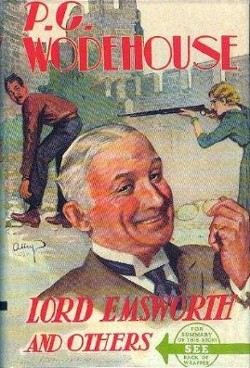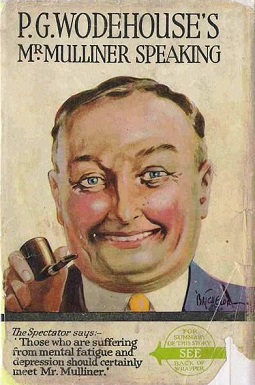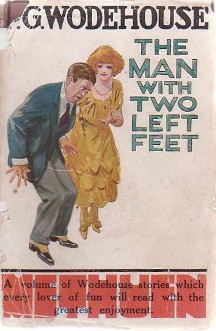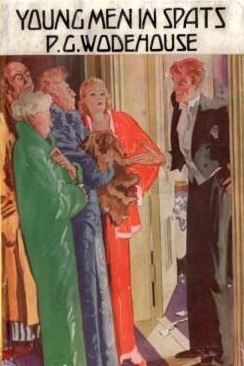Related Research Articles

Lord Emsworth and Others is a collection of nine short stories by P. G. Wodehouse, first published in the United Kingdom on 19 March 1937 by Herbert Jenkins, London; it was not published in the United States. The Crime Wave at Blandings, which was published on 25 June 1937 by Doubleday, Doran, New York, is a very different collection, sharing only three of its seven titles with the UK book. Penguin Books published a UK edition of The Crime Wave at Blandings in 1966. The stories in both books had all previously appeared in both British and American magazines.
Mr. Mulliner is a fictional character from the short stories of P. G. Wodehouse. Mr. Mulliner is a loquacious pub raconteur who, no matter what the topic of conversation, can find an appropriate story about a member of his family to match it.

Blandings Castle and Elsewhere is a collection of short stories by P. G. Wodehouse. It was first published in the United Kingdom on 12 April 1935 by Herbert Jenkins, London, and, as Blandings Castle, in the United States on 20 September 1935 by Doubleday Doran, New York. All the stories had previously appeared in Strand Magazine (UK) and all except the last in various US magazines.

A Few Quick Ones is a collection of ten short stories by P. G. Wodehouse. It was first published in the United States on 13 April 1959 by Simon & Schuster, New York, and in the United Kingdom on 26 June 1959 by Herbert Jenkins, London. The first US edition dust jacket was designed by Paul Bacon. The book's title comes from the informal phrase "a quick one", which is British slang for an alcoholic drink consumed quickly.

Eggs, Beans and Crumpets is a collection of short stories by P. G. Wodehouse, first published in the United Kingdom on April 26, 1940 by Herbert Jenkins, London, then with a slightly different content in the United States on May 10, 1940 by Doubleday, Doran, New York.

My Man Jeeves is a collection of short stories by P. G. Wodehouse, first published in the United Kingdom in May 1919 by George Newnes. Of the eight stories in the collection, half feature the popular characters Jeeves and Bertie Wooster, while the others concern Reggie Pepper, an early prototype for Bertie Wooster.

Mr Mulliner Speaking is a collection of nine short stories by P. G. Wodehouse. It was first published in the United Kingdom on April 30, 1929 by Herbert Jenkins, and in the United States on February 21, 1930 by Doubleday, Doran. The stories were originally published in magazines in the UK and the US between 1924 and 1929.

Meet Mr. Mulliner is a collection of short stories by P. G. Wodehouse. First published in the United Kingdom on 27 September 1927 by Herbert Jenkins, and in the United States on 2 March 1928 by Doubleday, Doran. The short stories were originally published in magazines, mainly The Strand Magazine in the UK and Liberty in the US.

The Man with Two Left Feet, and Other Stories is a collection of short stories by British author P. G. Wodehouse, first published in the UK on 8 March 1917 by Methuen & Co., London, and in the US on 1 February 1933 by A. L. Burt and Co., New York. All the stories had previously appeared in periodicals, usually The Strand Magazine in the United Kingdom and The Red Book Magazine or The Saturday Evening Post in the United States.

Mulliner Nights is a collection of short stories by P. G. Wodehouse. First published in the United Kingdom on 17 January 1933 by Herbert Jenkins, and in the United States on 15 February 1933 by Doubleday, Doran. The stories in the collection were originally published in magazines in the UK and the US between 1930 and 1932.

Thank You, Jeeves is a Jeeves comic novel by P.G. Wodehouse, first published in the United Kingdom on 16 March 1934 by Herbert Jenkins, London, and in the United States on 23 April 1934 by Little, Brown and Company, New York.

Young Men in Spats is a collection of short stories by P. G. Wodehouse, first published in the United Kingdom on 3 April 1936 by Herbert Jenkins, London, then in the United States with a slightly different selection of stories on 24 July 1936 by Doubleday, Doran, New York.

Reginald "Reggie" Pepper is a fictional character who appears in seven short stories by English author P. G. Wodehouse. Reggie is a young man-about-town who gets drawn into trouble trying to help his pals. He is considered to be an early prototype for Bertie Wooster, who, along with his valet Jeeves, is one of Wodehouse's most famous creations.
"A Slice of Life" is a short story by the British comic writer P. G. Wodehouse. A part of the Mr. Mulliner series, the story was first published in the UK in 1926 in The Strand Magazine, and appeared almost simultaneously in Liberty in the United States. It also appears in the collection Meet Mr. Mulliner. The main character in this story, Wilfred Mulliner, plays off-stage parts in "Mulliner's Buck-U-Uppo".
"The Truth About George" is a short story by the British comic writer P. G. Wodehouse. A part of the Mr. Mulliner series, the story was first published in July 1926 in Strand Magazine, and appeared almost simultaneously in Liberty in the United States. It also appears in the collection Meet Mr. Mulliner.
"Honeysuckle Cottage" is a short story by the British author P. G. Wodehouse. The story was first published in the 24 January 1925 issue of the Saturday Evening Post in the United States, and in the February 1925 issue of the Strand Magazine in the United Kingdom.
Plum Stones is a set of 12 volumes of uncollected short stories by P. G. Wodehouse. All 25 stories were previously published in magazines, but not published in book form in the UK. The volumes were published posthumously between 1993 and 1995 in the UK by Galahad Books. The first two volumes were published in 1993, the following six in 1994, and last four in 1995.
"Jeeves Makes an Omelette" is a short story by P. G. Wodehouse, and features the young gentleman Bertie Wooster and his valet Jeeves. The story was published in the Star Weekly in Canada in August 1958. The story was also included in the 1959 collection A Few Quick Ones.
"Fixing it for Freddie" is a short story by P. G. Wodehouse, and features the young gentleman Bertie Wooster and his valet Jeeves. Originally starring Reggie Pepper, the story was published in The Strand Magazine as "Helping Freddie" in the United Kingdom in September 1911, and in Pictorial Review as "Lines and Business" in the United States in March 1912. The story was later changed to feature Bertie Wooster and Jeeves when it was included in the 1925 collection Carry On, Jeeves.
References
- Notes
- ↑ McIlvaine (1990), pp. 99-100, A89.
- ↑ McIlvaine (1990), p. 145, D15.9, and p. 183, D133.25.
- ↑ Wodehouse (1968) [1966], chapter 7, p. 150
- ↑ Wodehouse, P. G. (December 1912). "Rallying Round Old George". Madame Eulalie. Retrieved 11 February 2018.
- ↑ Wodehouse, P. G. (27 September 1913). "Brother Alfred". Madame Eulalie. Retrieved 11 February 2018.
- ↑ Phelps, Barry (1992). P. G. Wodehouse: Man and Myth. London: Constable and Company Limited. p. 176. ISBN 009471620X.
- ↑ McIlvaine (1990), p. 183, D133.25.
- ↑ McIlvaine (1990), p. 145, D15.9.
- ↑ McIlvaine (1990), p. 154, D51.16.
- ↑ McIlvaine (1990), pp. 33-34, A21b and A22a.
- ↑ McIlvaine (1990), pp. 115-115, B5b, and pp. 129-130, B33a.
- ↑ Wodehouse (1997), pp. ii-v.
- ↑ McIlvaine (1990), pp. 301, J7.
- Bibliography
- McIlvaine, Eileen; Sherby, Louise S.; Heineman, James H. (1990). P. G. Wodehouse: A Comprehensive Bibliography and Checklist. New York: James H. Heineman Inc. ISBN 978-0-87008-125-5.
- Wodehouse, P. G. (1968) [1966]. Plum Pie (Reprinted ed.). London: Pan Books Ltd. ISBN 978-0330022033.
- Wodehouse, P. G. (1997). Enter Jeeves . New York: Dover Publications. ISBN 978-0-486-29717-0.